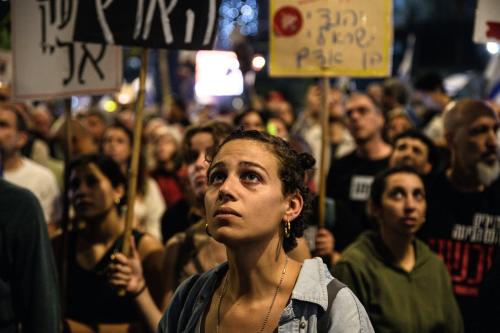When I spoke in Steamboat Springs, Colorado last week (as part of the Seminars at Steamboat series), I focused on two of today’s most pressing issues in the Middle East—Iran (the issue that’s hot) and Israeli-Arab peace (the one that’s not).
Politics prevails over everything else in Washington, so it’s no surprise that the hottest issue in town is the Iran deal. Although Israeli-Arab peace doesn’t feature prominently on the political agenda at the moment, the two issues are closely connected: The ongoing failure to resolve the Palestinian issue has made Israel’s Arab neighbors unwilling to cooperate with Israel on other issues, including their common enemy Iran. Concluding the Iran deal may help focus minds in the region and make it easier to resolve the Palestinian issue.
On the Iran deal, which I support, I realize that there are legitimate concerns with regards to the windfall sanctions relief will produce for Iran, the deal’s limited 10-year timeframe, and the Islamic Republic’s support for terrorism.
But the deal is actually much more robust than its critics often contend. It implements the most intrusive monitoring regime on a country’s nuclear program since the signing of the Nuclear Non-Proliferation Treaty. And not only does the agreement reduce Iran’s capacity to produce a nuclear weapon in the future, it rolls back Iran’s current nuclear program—by reducing its centrifuges and uranium stockpile—and therefore extends the breakout time needed to produce a nuclear bomb.
More broadly, the deal marks a turning point in how politics are done in the Middle East: In a region so beset by conflict, this agreement shows that there are other ways to settle differences. The United States hasn’t been able to negotiate a diplomatic deal in the Middle East in 17 years; now, it’s managed a major breakthrough on one of the most intractable issues in the region. In the context of tremendous volatility—with conflict in Iraq, Syria, and Yemen, among other challenges—an Iranian nuclear weapon would make the Middle East immensely more dangerous.
You make peace with your enemies, not your friends. While some say we should walk away and work on getting a better deal, the notion that there is an alternative agreement is a fairly dubious proposition (largely because international sanctions will be weaker). The fear that Iran is rolling across the region is far-fetched, due to Iran’s unpopularity among Sunni populations. While the Middle East remains utterly labyrinthine in various ways, securing this deal with Iran can open a path to progress on other issues. Ultimately, it can help reduce the risk of conflict in the troubled region.



Commentary
What’s hot and what’s not in the Middle East
September 3, 2015